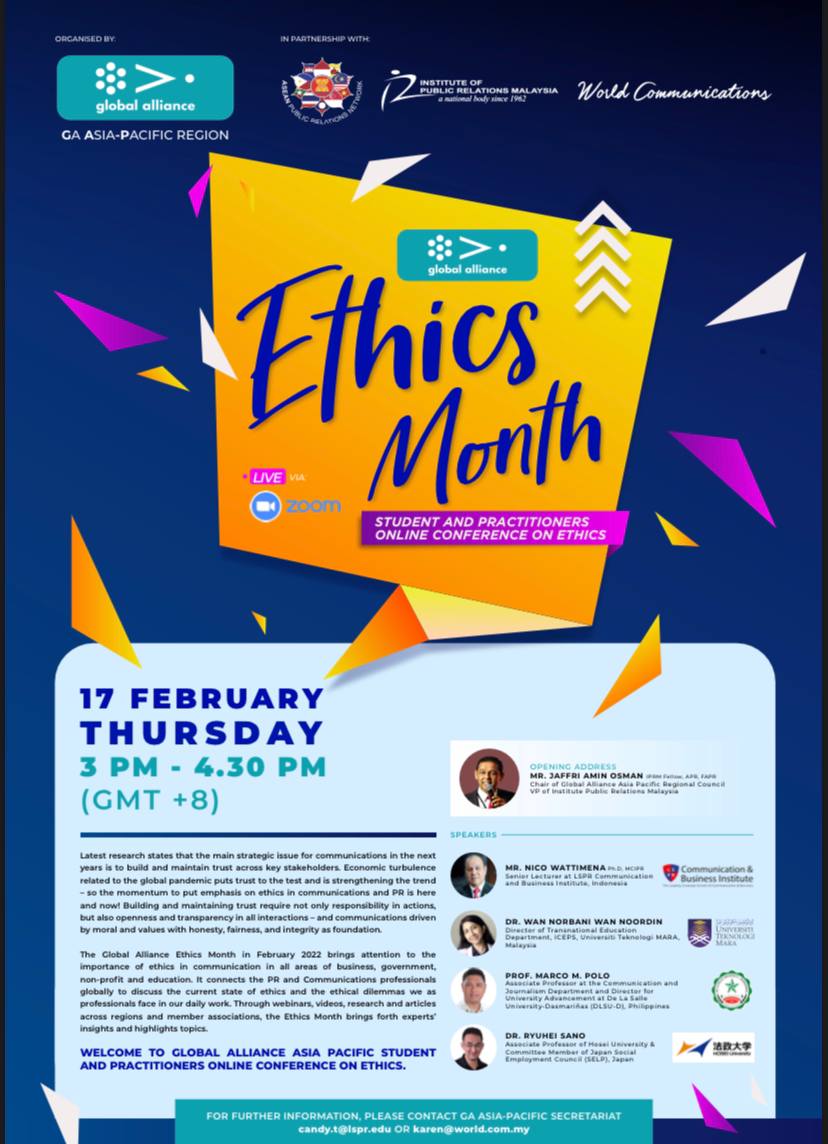By Nik Nayly
KUALA LUMPUR, 23 February 2022: The issues of trust and ethics across areas of business, government and educational institutions were the main highlights of the discussions that featured in the Global Alliance Asia Pacific Students and Practitioners Online Conference on Ethics.
This conference, held in conjunction with the Global Alliance Ethics Month last Friday (17 February), was organised by Global Alliance Asia-Pacific Region in partnership with ASEAN Public Relations Network (APRN) and Institute of Public Relations Malaysia (IPRM).
œThe recent result from the Edelman Trust Barometer 2022 shows that business is the only trusted institution, as the trust for the media and the government has declined, both being viewed as divisive, Mr. Jaffri Amin Osman, the Chair of Global Alliance Asia Pacific Regional Council and the Vice President of Institute Public Relations Malaysia told the session.
The organisers had invited four speakers representing the Asian educational institutions to discuss the current state of ethics and ethical dilemmas faced by professionals. They are from Universiti Teknologi MARA (UiTM), LSPR Communication and Business Institute from Indonesia, De La Salle University Philippines, and Hosei University Japan.
The Director of Transnational Education Department ICEPS from UiTM, Dr. Wan Norbani Wan Noordin presented on Media Literacy and Ethics, highlighting the question œwhy media literacy is important in fostering trust in media for communication professionals in government, corporations and Non-Governmental Organisations (NGO) across the globe”.
According to Wan Norbani, media literacy are “practices to critically analyse, understand and evaluate media messages should be followed by asking questions”.
She posed questions as follows: Who created this message? What techniques are used to attract my attention? How might people understand this message differently? What lifestyles, values and point of views are represented or omitted from this message? Why was this message sent?
œMoral and ethical behaviour within the media environment is needed to ensure trust in the narrative. Media literacy especially now is a need because with the right information comes understanding, realisation, and hopefully followed by positive behavioural change after, she highlighted.
Meanwhile, Mr. Nico Wattimena, Senior Lecturer from LSPR Communication and Business Institute, Indonesia, shared on “Sustainability or Greenwashing and its relations to Business Ethics today”.
He said: œGreenwashing is an intentional or accidental deception tactics employed by companies that make customers believe that their products or services are environment-friendly.
Mr. Nico cited a classical example of greenwashing when the automaker Volkswagen cheated on pollution admission tests by equipping the vehicles with a ‘defect device’.
He also emphasised greenwashing as the eco-version of white lies and an attempt by big companies or businesses to appear more green, sustainable, ethical and to distract people from the every-day reality of what is not being done.
Meanwhile, the associate professor from Communication and Journalism Department, who is also the Director for University Advancement at De La Salle University Philippines, Marco M. Polo, discussed the need for global journalism ethics and standards.
He highlighted that global ethics and standards for journalism is essential “because now we have a global audience”.
“Readers or viewers are no longer limited to our own geographical places, it has extended beyond that.
“Next, there is also a plurality of perspectives. There are different views and media biases from the conservatives to the liberal, radical and centrists. Finally, the need for global ethics in journalism is because of the international impact and reach of news,” he stressed.
Therefore, he said, journalists must practice accuracy, truthfulness, fairness, and reliability while serving the interests of the readers.
Lastly, Dr. Ryuhei Sano, the associate professor from Hosei University and a committee member of Japan Social Employment Council (SELP) Japan, highlighted on the ethics in employment disability or among the disabled people.
Ryuhei presents a few viewpoints on ethics and communication with disabled people in a professional setting.
The first viewpoint is on the people’s first language which refers to the interaction between people with impairments or disability.
For example, œNowadays, the term generally accepted in the business sector is called accessible parking or bathroom and not handicapped parking or bathroom. These terms are sensitive for people with disabilities, which we should keep in mind, he said
Ryuhei shared another viewpoint, which is on privacy and reasonable accommodation. He presented a few cases of ethics in employment persons with visual impairment.
œConsiderations such as colour universal design, assistance in writing, magnification, things arranged in clock position, and also proper guidance for persons with visual impairment are needed, he added.
“On the other hand, for those with hearing impairment at workplace, it is highly encouraged to consider sign language interpretation, communication or writing board, and other necessary support for urgent cases such as an emergency.
œIn the eyes of persons with physical disabilities, an accessible working or office environment is a must, Ryuhei told the live discussion.
The conference was held from 3 p.m. to 4.30 p.m. at PNB Perdana Hotel Kuala Lumpur, Malaysia and streamed on Zoom.
More information on Global Alliance Ethic Month and the Institute of Public Relations Malaysia (IPRM) can be retrieved through these official websites: https://www.globalalliancepr.org/global-alliance-ethics-month and https://iprm.org.my/ ***
